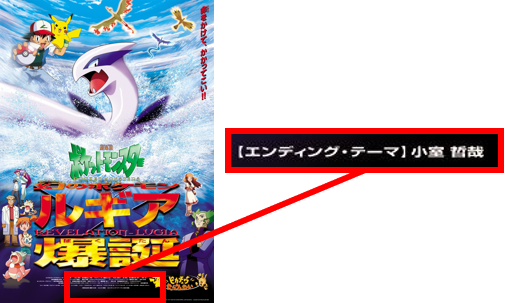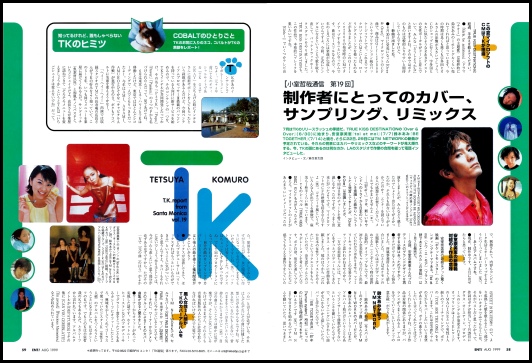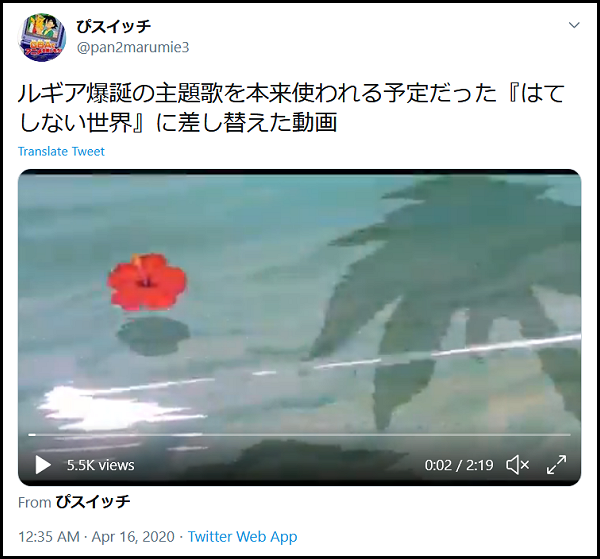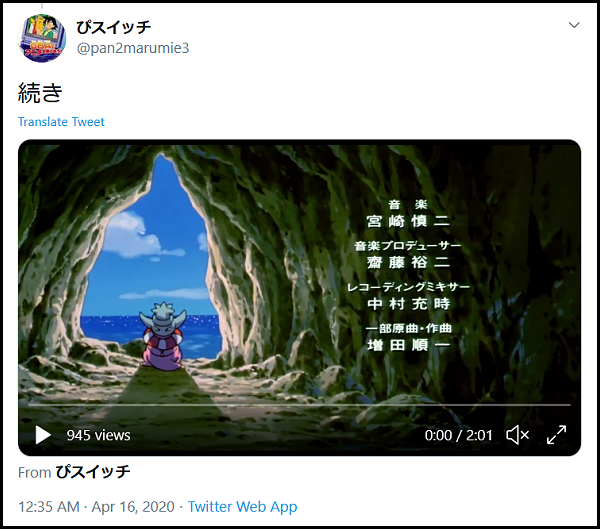
The Ending Theme
Saga



Main
Old Updates Archive
Links
 |
Lists |
List of Pokémon
Pokémon World Atlas
List of Techniques
List
of Items
List of TV Episodes
 |
Guides |
Episode
Comparisons
Movies
& Specials Guide
CD Guide
DVD Guide
Voice
Actors Guide
Lyrics Archive
Manga Guide
Video Games
 |
Miscellaneous |
Humor
Pokemon Bashing
Features
Rants
E-Mail Me
Dogasu's
Backpack
| Movies & Specials Guide | Revelation Lugia
The ending theme to the film Pocket Monsters The Movie "Revelation Lugia" is a song called toi et moi, performed by the Japanese mega popstar Namie Amuro. But did you know the song actually wasn't the filmmakers' first choice? And that they were originally going to go with a much slower, much calmer song instead?
Let's start by looking at how toi et moi was announced to the world. The song that would eventually become the ending theme to the second Pocket Monsters movie was produced, composed, and arranged by Tetsuya Komuro (小室哲哉), one of the most prolific Japanese music producers of the 1990s. This guy was everywhere back in the day; the year that Pocket Monsters The Movie "Revelation Lugia" came out, for example, T.K. -- as we was often referred to at the time -- had produced twelve of the Top 100 pop songs in Japan.
According to this archived version of a Tetsuya Komuro fansite called TK@EXPO, Mr. Komuro's involvement with the second Pokémon movie was first announced on March 5th, 1999:

An early version of the final Revelation Lugia poster credits Mr. Tetsuya Komuro with providing the ending theme since, presumably, Ms. Amuro's involvement with the film had not been finalized yet.
On June 17th, 1999 -- one month before the movie was set to be released -- TK@EXPO reports that Mr. Komuro had found his singer:
That "second single" being referred to is probably Something 'Bout The Kiss, which eventually ended up being released a few months later on September 1st, 1999.
The earliest mention of Ms. Amuro in CoroCoro Comics, meanwhile, is in their August 1999 issue. That would have gone on sale on July 15th, 1999.

So in summary, the song is reported as being in the works and then, a few months later, its artist, title, and release date are all announced. Ordinarily this is where the story would end but with toi et moi, however, things are a little bit more interesting!
Thanks to his superstar status in the music industry, probably, Mr. Tetsuya Komuro was given a monthly column in the pop culture magazine Nikkei Entertainment in which he was able to promote the projects he had coming out in any given month.

In the August 1999 issue's edition of his "T.K. report from Santa Monica" column, Mr. Komuro makes a passing reference to how Ms. Amuro's song actually wasn't the film makers' first choice for the movie's ending theme.
The overwhelming majority of the article has nothing to do with Pocket Monsters so I'll only be translating the relevant part. A quick bit of background information before we get started: Ms. Amuro spent the majority of 1998 on maternity leave and so 1999 was being set up as her big comeback year.
"And at first they hadn't decided to go with Namie-chan"...so toi et moi wasn't their first choice for the movie's theme song? Is there a way to know what was?
Thankfully, there is! The film's screenplay writer, Mr. Takeshi Shudo, provided us with more details about ten years after the fact in a blog post of his dated December 9th, 2009:

The "song based on the flute melody that the shrine maiden Fleura plays (the one that's on the soundtrack CD)" can't possibly be anything other than Track 6 on the film's original soundtrack, The Endless World (はてしない世界), performed by Fleura's voice actress Ms. Akiko Hiramatsu.
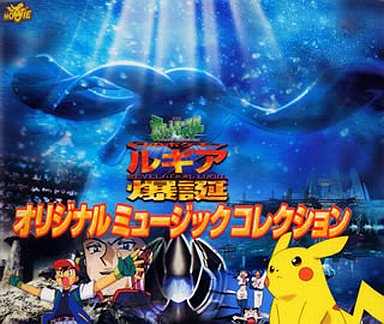
A fan edit of the end credits to the second movie where toi et moi is swapped out with The Endless World was made by P-Switch (ぴスイッチ) and posted on Twitter. This gives us a pretty decent idea of what the ending probably would've felt like if they hadn't swapped the songs out at the last minute. The video's embedded in the tweets and is divided into two parts:
Part One
Part Two
It sure does give that ending animation a completely different feel, doesn't it?
The copyright scandal Mr. Shudo brings up is most likely a reference to Mr. Komuro's 2006 arrest for allegedly defrauding an investor out of 500 million yen by promising to sell them the rights to music he no longer had in his possession. The Osaka Regional Court found him guilty of the fraud charges a little over half a year before Mr. Shudo made his blog entry.
The singer half of the duo is also obviously meant to be Namie Amuro who, as he alludes, was still topping the charts even ten years later. She eventually retired from the music industry in 2018.
Takeshi Shudo's blog continues with him adding that he really, really hated this replacement song:
He certainly doesn't hold back, does he?
Now, a 60-year-old man going on the record as not liking a contemporary pop song isn't exactly shocking. It happens all the time! But to see Mr. Shudo be this blunt about his distaste of the song sure is a refreshing display of candor we rarely get with the people involved in this franchise.
Regardless of how Mr. Shudo feels, the song was -- and continues to be -- associated with the second Pocket Monsters movie. And last minute replacement or not, it still has a lot of fans who really, really like it.
Making movies is a long, arduous process with many moving parts, all working at the same time. A lot of the decisions and course corrections made during production are never really made public and so being able to point to a change as huge as a theme song swap in a Pocket Monsters movie really is something special. Just think, we could have lived in a timeline where The Endless World was the ending theme to the second film instead of toi et moi!
What do you think? Do you think the filmmakers made the right choice?
The ending theme to the film Pocket Monsters The Movie "Revelation Lugia" is a song called toi et moi, performed by the Japanese mega popstar Namie Amuro. But did you know the song actually wasn't the filmmakers' first choice? And that they were originally going to go with a much slower, much calmer song instead?
| The
Tetsuya Komuro / Namie Amuro combo is formed |
Let's start by looking at how toi et moi was announced to the world. The song that would eventually become the ending theme to the second Pocket Monsters movie was produced, composed, and arranged by Tetsuya Komuro (小室哲哉), one of the most prolific Japanese music producers of the 1990s. This guy was everywhere back in the day; the year that Pocket Monsters The Movie "Revelation Lugia" came out, for example, T.K. -- as we was often referred to at the time -- had produced twelve of the Top 100 pop songs in Japan.
According to this archived version of a Tetsuya Komuro fansite called TK@EXPO, Mr. Komuro's involvement with the second Pokémon movie was first announced on March 5th, 1999:

| 3月5日(金) ■新聞・TV: ”小室+ポケモン” 小室氏が、4日に都内でビデオ会見を行い、ポケットモンスター劇場版「ミュウツーの逆襲」に続く第2弾、この 夏に全国公開になる「ポケットモンスター劇場版 幻のポケモン・ルギア爆誕」のエンディングテーマ曲を担当す ることがわかった。楽曲はすでにほぼ出来あがっているが、誰が歌うかは現段階では未定。 「日本のエンタテインメントで世界に通用するのはキャラクター。キャラクターが羨ましくて、音楽で参加できた らという希望があった」とTK。現在ポケットモンスターは世界7カ国で放送中。ニューヨークでは、ピカチ ュウカーによるパレードが行われるほどの人気ぶり。アジア各国、そしてTKの新たな拠点となるハワイでもポケモンは大人気だ。映画も海外で公開されてゆく 予定があるそう。 |
Friday, March 5th Newspaper & TV "Komuro + Pokémon" On March 4th Mr. Komuro held a video conference in Tokyo where it was announced that he would be in charge of the ending theme to Pocket Monsters The Movie "Revelation Lugia," this summer's follow-up to Pocket Monsters The Movie "Mewtwo Strikes Back!" The song is already nearly finished but at this moment its performer has not been decided. "The thing about our Japanese entertainment exports that resonates with everyone else in the world are our characters. People look up to our characters and have hopes of being able join in on the fun via music" says TK. The Pocket Monsters animated series is currently being broadcast in seven countries around the world. Pokémon is so popular that there was even a parade held in New York in which Pikachu appeared. It's also extremely popular in various countries around Asia as well as in Hawaii, where TK has set up a new office. It seems that there are already plans to release the Pokémon movies overseas. |
An early version of the final Revelation Lugia poster credits Mr. Tetsuya Komuro with providing the ending theme since, presumably, Ms. Amuro's involvement with the film had not been finalized yet.
On June 17th, 1999 -- one month before the movie was set to be released -- TK@EXPO reports that Mr. Komuro had found his singer:
| 6月17日(木) ■新聞・TV: ”安室、ポケモン歌う 7月、2枚の新曲” 夏休みに公開されるアニメ映画「ポケットモンスター劇場版・幻のポケモン ルギア爆誕」のエンディングテーマを、安室奈美恵が歌う。曲は7月7日発売で 「toi et moi」。「小さい子にもわかるように歌った」、と安室。同28日にはアメリカの若手大物プロデューサー、ダラス・オースティン氏による作品を日本人とし て初めて歌い、発売する。 ポケモンの映画の曲に関して、小室哲哉氏のVTR(in HAWAII)も各番組で放送された。「ポケモンと本格的なブラックミュージック、プロデューサーとのコラボレーション(協力関係)。これを両方同時期に 見せることが出来るのは、やっぱり奈美恵ちゃんしかいないというのをどうしてもわかって欲しい。もう一回、奈美恵ちゃんの価値を みなさんが再確認してくれたら、僕のプランは良かったということになる」 (TBS EXPRESS) |
Thursday, June 17th Newspaper & TV "Amuro, Sings Pokémon, Releases Two New Songs in July Namie Amuro will be singing the ending theme to Pocket Monsters The Movie "Revelation Lugia," in theaters just in time for summer vacation. The song is called toi et moi and it will go on sale July 7th. Amuro says "I sang it in a way that even little kids can understand it." And then on July 28th, a Namie Amuro song produced by the fresh new big-shot American producer Mr. Dallas Austin, in his first ever collaboration with a Japanese artist, will also go on sale. In regards to the Pokémon movie song, video clips taken in Hawaii of Mr. Tetsuya Komuro talking about it have aired on various TV shows. "Pokémon has formed a partnership with both a producer and a figurehead in the black music industry. I really, really want people to see that only Namie-chan has the ability to juggle both of these at the same time. If people take another look at Namie-chan and re-discover just how amazing she is then I'll feel like my plan is working." (TBS Express) |
That "second single" being referred to is probably Something 'Bout The Kiss, which eventually ended up being released a few months later on September 1st, 1999.
The earliest mention of Ms. Amuro in CoroCoro Comics, meanwhile, is in their August 1999 issue. That would have gone on sale on July 15th, 1999.

| !エンディングテーマは安室奈美恵さん‼ 映画のエンディング曲「トワ・エ・モア」は、人 気タレント・安室奈美恵さんが熱唱‼ ▲合唱力バツグンの安室奈美恵さんが、劇場版ポ ケモンに参加!早く聴いてみたいぜ‼ |
! The
ending theme will be performed by Ms. Namie Amuro!! The movie's ending theme toi et moi will be performed by the popular celebrity Ms. Namie Amuro!! Image Caption: Namie Amuro, with her amazing singing voice, will be participating in the Pokémon movie! We can't wait to hear it!! |
So in summary, the song is reported as being in the works and then, a few months later, its artist, title, and release date are all announced. Ordinarily this is where the story would end but with toi et moi, however, things are a little bit more interesting!
| "toi
et moi" wasn't the filmmakers' first choice? |
Thanks to his superstar status in the music industry, probably, Mr. Tetsuya Komuro was given a monthly column in the pop culture magazine Nikkei Entertainment in which he was able to promote the projects he had coming out in any given month.

In the August 1999 issue's edition of his "T.K. report from Santa Monica" column, Mr. Komuro makes a passing reference to how Ms. Amuro's song actually wasn't the film makers' first choice for the movie's ending theme.
The overwhelming majority of the article has nothing to do with Pocket Monsters so I'll only be translating the relevant part. A quick bit of background information before we get started: Ms. Amuro spent the majority of 1998 on maternity leave and so 1999 was being set up as her big comeback year.
| 安室奈美恵の新曲はアッと驚く映画『ポケットモンスター』のエンディングテーマであ
る。『toi et moi (トワ・エ・モア) (フランス語であなたとわたしの意味)』 は7月7日発売だ。 ―今回、安室奈美恵さんのプロデュースのグラン ドデザインを再考する必要はあったのですか? ●ボクだけでなくスタッフも悩みました。所属事 務所ともよく話し合いました。たとえばポケモンの主題歌というのはボクがずっと温めてきた (ここぞという時の最終兵器的) タイアップなんです。最初から奈美恵ちゃんで行くと決めていたわけではありません。ファミリーキャラクターとの安易なタイアップと思われかねませんから。 |
Namie Amuro's
new song is going to be...wait for
it!..the ending theme for the Pocket
Monsters
movie. The single for toi
et moi, which is French for "you and me," goes on sale July
7th. Did you have to reconsider how you were going to produce Ms. Namie Amuro this time around? "Sure, but it wasn't just me; the whole staff was worried too. We talked with the record label a lot. For example, I had had this idea of doing a Pokémon theme song on the back burner for a while now (in a "we've got this trump card up our sleeve" sort of way) as a type of cross-promotion opportunity. And at first they hadn't decided to go with Namie-chan. But doing a family friendly collaboration is kind of a no-brainer, you know?" |
"And at first they hadn't decided to go with Namie-chan"...so toi et moi wasn't their first choice for the movie's theme song? Is there a way to know what was?
Thankfully, there is! The film's screenplay writer, Mr. Takeshi Shudo, provided us with more details about ten years after the fact in a blog post of his dated December 9th, 2009:

| ただし、エンドタイトルに流れた曲……もとも
とは巫女のフルーラが吹いた笛のメロディを基調にした歌(CDには収録されている)が用意されていたにもかかわらず、上映されたものでは、誰が起用したの
か知らないが、10年前当時ヒット曲を連発していた作曲家と歌手のコンビの歌に変更されていた。歌手のほうは今もヒットを連発しているが。作曲家は著作権
関係の問題を起こして、一時大騒ぎになり、最近はその人の作曲した曲をあまり聞かない。 |
However, the song that plays during
the ending credits...we had originally prepared a song based on the
flute melody that the shrine maiden Fleura plays (the one that's on
the soundtrack CD) but someone, and I don't know who it was, decided to
swap it out with a song made by this duo of a singer and composer who,
at least
a decade ago, had been producing a string of chart toppers. The singer
is still pumping out the hits, even today, but the composer had this
copyright scandal that was all over the news for a while there, and
these days you don't really hear any new music from him anymore. |
The "song based on the flute melody that the shrine maiden Fleura plays (the one that's on the soundtrack CD)" can't possibly be anything other than Track 6 on the film's original soundtrack, The Endless World (はてしない世界), performed by Fleura's voice actress Ms. Akiko Hiramatsu.

A fan edit of the end credits to the second movie where toi et moi is swapped out with The Endless World was made by P-Switch (ぴスイッチ) and posted on Twitter. This gives us a pretty decent idea of what the ending probably would've felt like if they hadn't swapped the songs out at the last minute. The video's embedded in the tweets and is divided into two parts:
Part One
Part Two
It sure does give that ending animation a completely different feel, doesn't it?
The copyright scandal Mr. Shudo brings up is most likely a reference to Mr. Komuro's 2006 arrest for allegedly defrauding an investor out of 500 million yen by promising to sell them the rights to music he no longer had in his possession. The Osaka Regional Court found him guilty of the fraud charges a little over half a year before Mr. Shudo made his blog entry.
The singer half of the duo is also obviously meant to be Namie Amuro who, as he alludes, was still topping the charts even ten years later. She eventually retired from the music industry in 2018.
Takeshi Shudo's blog continues with him adding that he really, really hated this replacement song:
| ともかく当時のヒットメーカーコンビの曲だと
してもひどかった。 何を言いたいのか分からない聞き取りにくい歌 詞と、うんざりするほど聞きなれたオリジナリティのないポップ調の曲が、まるで作品内容にあっていない。お そらく、アニメ脚本どころか、『ポケモン』がどんなゲームかすら知らずに作られた曲なのだろう。10年たった今も、聞くとがっかりする。 1作目の小林幸子さんのエンディング曲がよ かっただけに、なおさらである。 もっとも、海外版は違う曲に変えられただろう から、『ルギア爆誕』のエンディング曲は日本語版に限られるだろうというのが、せめてもの救いである。 |
In any case, the song that those
contemporary hit makers came up with was absolutely terrible. The
message of the song is unclear, the lyrics are hard to make out, and
the whole thing's just a tired old pop song that
has nothing to do with the movie it's being used for. I suspect they
made this song without
knowing what kind of video game Pokémon
is, or without ever reading a single script from the TV show. Even now,
ten
years later, I feel a sense of disappointment whenever I hear this song. Ms. Sachiko Kobayashi's ending theme to the first movie was really good, and I feel that way now even more. Understandably, the song wasn't used in the versions released overseas and so it seems like this Revelation Lugia ending theme is exclusive to Japan. So at least the rest of the world has that going for them. |
He certainly doesn't hold back, does he?
Now, a 60-year-old man going on the record as not liking a contemporary pop song isn't exactly shocking. It happens all the time! But to see Mr. Shudo be this blunt about his distaste of the song sure is a refreshing display of candor we rarely get with the people involved in this franchise.
Regardless of how Mr. Shudo feels, the song was -- and continues to be -- associated with the second Pocket Monsters movie. And last minute replacement or not, it still has a lot of fans who really, really like it.
| Final
Thoughts |
Making movies is a long, arduous process with many moving parts, all working at the same time. A lot of the decisions and course corrections made during production are never really made public and so being able to point to a change as huge as a theme song swap in a Pocket Monsters movie really is something special. Just think, we could have lived in a timeline where The Endless World was the ending theme to the second film instead of toi et moi!
What do you think? Do you think the filmmakers made the right choice?
Found an error? Spot an omission? Please help me keep this page current and error-free by e-mailing me with a description of the error or omission.



